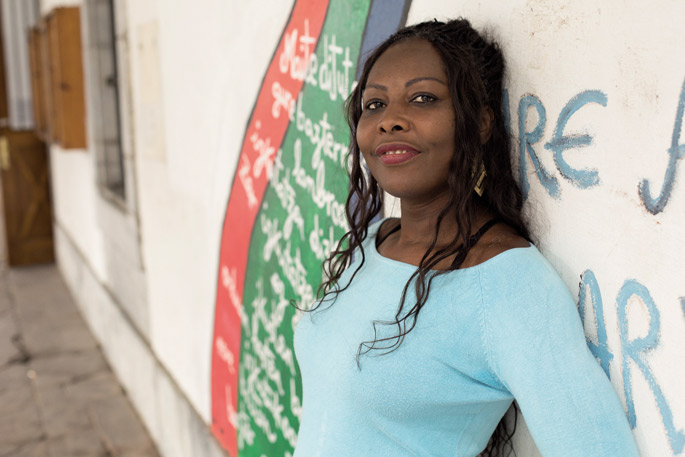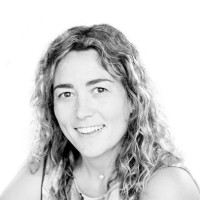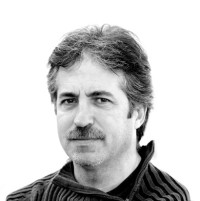"For many coals are just two pieces of iron, for me they're very important."
- Lesaka Brazilian and Brazilian from Lesaka. It has clung to all kinds of sports, football, sokatira, hacha and, above all, brasas. He has studied Spanish, Basque and French with the same intrepidation.

Why Xanta?
My name is María Do Amparo. In Brazil, I was always called “Santa,” because there it is common to use aliases. Here, on the other hand, they told me that I was not “holy” and I stayed with the Xanta.
What memories do you have since childhood?
We were ten brothers. Now we have eight, and my mother has always been the most important to me. We lived in a hamlet there and in many things, compared to the hamlets here, it was very similar.
The coals, for example, are very special to me, because they remind me of the works of my childhood. We were carrying water and milk in the cubes. Milk from one farm to another, perhaps on the long stretch between Lesaka and Bera. And water. There had been no water in the houses for a long time, and we had to go and look for it in the river. When I was a kid, I didn't like to take the floor, and now, look! There's a kind of coincidence in life.
Is the rural environment the same?
Yes, but here the land is harnessed more. I've already noticed that. Those who live there in the dwellings or people on the front knees, like my parents, yes. But young people or those who don't live in traditional farmhouses don't grow the land like here. If you have a piece of land near the house, you can take advantage to install a small orchard. There we have a lot of land in Brazil, for free, and people don't take any advantage of it.
Did he also have animals?
Yes: cows, pigs… of everything. My two brothers and my parents are still in the house. The truth is, this world attracts me a lot.
When did you come to Lesaka?
18 years ago I was 24. At that age you're very brave and you think you know everything. But I do not regret at all that everything has gone very well. At first I had bad moments, not because of the people or the place, but because of the lack of family, especially my parents. And his friends. At first you are like a child and you have to start learning everything from scratch: talking, walking on your own… It has been my luck that our mother has always taught us to adapt to our case.
Is your mother as hard as you?
Yes. Very wrestling. He had ten children one after the other in the house and brought the whole family forward. It's a phenomenon. I remember getting up at four o’clock in the morning to drop our clothes, our food… all ready before we go to work at others’ homes. The father also worked a lot, but in addition to the outside work, all the work of the house was for the mother. There the men arrived and needed the food prepared and put on the plate. Children will never be like mothers. We will never reach its level.
Do you see your parents?
I go every year, and although I'd like to go more, I'm glad that not everyone can do it. The trip is very expensive and you also need time. I go in January, for a whole month, and I take all the time to be with them. I'm lucky because my skipper gives me the opportunity to take all the holidays in a row. I thank you very much. When I'm here I want to go and while I'm there I'm always thinking about how things are going here.
How did it come?
There I met my husband. It's lesakarra and there he went on vacation. After a while, she started walking with her and told me she wanted to bring me to know what's here. I said no. At home, too, everyone was telling me it wasn't. To be suspicious. They hurt me terribly. He proposed to marry me a year later and I accepted him, because I saw that that was a different situation. And we came. The first six months were very hard. The hardest thing, not knowing the language, was to communicate with people. My husband knows about Portuguese and he helped me, but when he wasn't too bad.
When I came there was still no Spanish lessons for foreigners and I happened to find the opportunity in Pamplona, Caritas. I would go twice a week to class and have a frightening cold in the old bus station, because I had to wait two hours for the bus to arrive. I spent six months in class and slowly began to realize that I understood more and more things. For me it was like waking up. One day you realize it turns on TV and you understand it, without the volume giving it everything. Television, radio, heart magazines, books… Woe to me! How many books I have read from Pío Baroja!
I want to speak well and correctly in Spanish, but without losing my tone, which is like my brand of identity. I want to be me. I want to maintain my personality and respect that of others.
Did the sport help you find your place in Lesaka?
Yes, no doubt. When I got away from my family, I needed something that could fill this gap. I walked into the choir, for example, but I wasn't happy. Still, I was lucky that a choir girl would ask me if I wanted to test the sokatira group they had to do. I started practicing rural sport through it. I didn't know what that was, and also at that time it wasn't as widespread as it is now. So I did, and I loved it. I immediately felt that was what I was looking for. There I was doing a lot of sport in Brazil and in this team I found a very healthy and beautiful environment. There is no rivalry between the teams. Everyone is helping everyone, and families and friends are always there to give encouragement. For me, it's a great family. I am very observant and that is what I have seen from the very beginning.
What has sport taught you?
A lot. You always want to overcome yourself, set up your new brands. I love it. So I started to pull the rope, very comfortable, but it's a pity that we haven't been able to go on because of a lack of people. If you fail and there's no substitute, you'll end the group. Many have been forced to leave for reasons of work or children. Competitions are always held on weekends and sometimes longer days and for some that is not compatible with the work.
As I was going like this, I was presented with the opportunity to participate in the collection of the jacket. They needed a girl and I went. The first time I had nothing to do with it, but this sport hooks you up.
And have you started with the axe?
Yes. It's harder, but that's my challenge for the future. I am very stubborn and I have to get it! (ja ja ja ja ja ja ja ja ja ja). It is not just strength, it is very important to use technique and tool well.
And with the arpan, you get along too.
Yes, but it doesn't particularly meet me. If you have to, I do, but my real love is to play brasa. They're not valued. For many people, they're just two pieces of iron, but for me they're really important. This is what I really like.
What is your brand?
40 kilos per hand, but in the championships we carry 25 kilos per hand.
And how do you get that?
The technique is very important: you have to know how to grab the slime. At first, your fingers hurt. Then they get numb and you don't feel them. So you think about everything I can carry. You struggle with yourself. I don't want to be more than anyone, I always want to push my limit. I want to be me.
Workouts in Oronoz?
Yes, with Patxi Larretxea. It's very nice, but it's also very hard. Also, don't think you're going to get out of work, go there and start training right away, no. First you have to prepare the logs for the axe, clean things… Patxi works on the mountain all morning, five or earlier, and comes in the afternoon to run the training sessions. What I admire most is the terrible energy this man has. She gets up at four o'clock in the morning, she works all day, and in the afternoon she still has incredible vitality. Once all prepared, warming is done and training begins. We meet two or three times a week. If you want to go more it is in your hands, as Patxi and his brother Donato are there every day.
Do you practice another sport?
I usually walk a lot on the mountain, on the bike… I don’t like running because I get nervous. I used to play football, but nobody wants to play with me because I'm pretty wild and my rivals' legs suffer a lot because of me. I played a lot in Brazil.
You've learned Basque.
I'm doing it. The Basque came after he began to practice sport. With the crew, with friends, everything was always talked about in Basque and I didn't like having to have a translator. I like to understand things on my own, and that's why I entered the Basque Country. I met very friendly people and with them we go to the sidrerías, we make exits. The most interesting thing is to get the best out of every situation.
And then the French.
That's right. I started working at Ibardin because I needed a fixed job to travel to Brazil. I was told that working in Ibardin was very hard and that I also had to know French. I said: “All right, one more challenge.” So I started with private classes and then I started at Irun's Language School. I have been in Ibardin for fifteen years now.
What do you do there?
I work in public in store, selling clothes, memories… of everything. Ibardin is a very nice place. That's how tremendously good Navarre has: landscapes, beautiful views. The road is very winding, but we are used to it. You always have to look at the positive side. I feel privileged to work in such a nice place. I have an hour to eat and when long ago I feel comfortable looking at the landscapes.
What do you do in your spare time, in addition to sports?
Dance with friends, go for dinner. With the Herri Kirolak team we also make great excursions and eat. I don't know why, but here everything ends around a table.
Don't you have children?
No. Now it doesn't make much sense anymore. At another time I wanted to take two children there, Mateo and Jessica, to bring them here, but I was getting a lot of hindrances and also the family was asking me a lot of money. I have that grief, but in life it can't be everything. When I go, I'm with them.
Is there much difference between the character of the people of Brazil and Euskal Herria?
They're two different worlds and you can't compare them. There, the climate is very different. It's tropical and it's always hot. That really marks people's nature and customs. Here also in summer the streets, the terraces, are full of people, it's a lot of parties. Instead, when it's cold, everything changes. That's the thing here, and you can't change it. How sad it would be to be able to change nature itself! I hope it will never happen.
In Brazil, we are very open, we love music and we live in the day. Before you go home you always have the chance to be with your friends and take a drink, but the weather allows you. There, at 5 a.m., it is absolutely clear. Starting at 7 p.m., many people practice sport. Brazil is the country of sport. It's sacred and being fit is very important to people.
For aesthetics or health?
Especially for aesthetics. But as everywhere there is everything, not just slender bodies. They are also thick and more and more numerous. It gets a lot of sport because we like it. We're also open, but in quotation marks.
What does this mean?
The tourist will find that they are all very cheerful, but to know how people are, you have to live with them. I would not dare to say that the people here are cold and closed. It's the nature here, nothing else. It also depends on the behavior of the person coming from outside. If you close, it goes wrong. You should try to contact people. That doesn't mean, of course, that you have to lick anyone's shoes, let alone. You have to be you, but trying to open yourself to others. I respect you as you are and you respect me. These are the rules of the game. It's a matter of attitude.
1972, Valença (Bahía, Brasil)
Duela 18 urte Lesakara ezkondu eta berehala sartu zen Baztan-Bidasoa Herri Kirol Taldean. Gaur egun Euskal Herriko eta Nafarroako txinga eramatean txapelduna da. Esku bakoitzean 25 kiloko zamarekin 28 metroko 48 plaza, hiru laurden eta 2,35 metroan dago bere marka, Euskal Herriko onena.
“Lesakako lehen beltza ni izan naiz. Kanpotarrak baziren baina Estatukoak gehienak. Ezin naiz kexatu, jendeak beti oso ongi tratatu nauelako. Oso aldarte gogorra dut, burugogorra naiz eta horregatik ezin naiz kexatu, maitasun ikaragarriarekin zaindu nautelako”
How easy we judge people next to (or not next to). Everything else is easy, except for your own. We then seek a solution to others. And how hard it is to manage what you have inside. Many times we idealize specific people, as if they were all right. And how little we know about... [+]
Duela hogei urte izan zen, Japoniako Akita hirian jokatu zen txapelketa batean: podiumetik alde egin zuen Sakanako sokatira taldeak Espainiako ereserkia entzutean. Une hura eta geroko zalaparta ondo gogoan dute Bea Razkinek eta Nerea eta Belen Lizarragak, aldarria egin zuten... [+]
There are numerous measures that are being taken in our environment to improve the quality of sport, both to concretize the minimum training of technicians of different levels and areas, and to promote their professionalism, as well as to promote specialisation in the sports... [+]
I believe that in any negotiation internal reflections before sitting at the table are very important. We must measure the forces of those involved and know how far you are prepared to go. Regretting what you've done, what you've said, and above all what you've signed, will make... [+]
Ane Elordi (Zornotza, 1991) Arratiako Harriti nesken taldera batu zen orain hiru bat hilabete. Talde lanean 500 kiloko harriari tiraka erakustaldiak eskaintzen dituzte. Indarra behar da, baina gakoa koordinazioan dagoela dio.
Suedian jokatutako txapelketan lortu dute domina, lur gaineko 580 kilogramoko proban lehiatuta. Sokatirako taldeak 2014an lortu zuen ofizialtasuna.






















